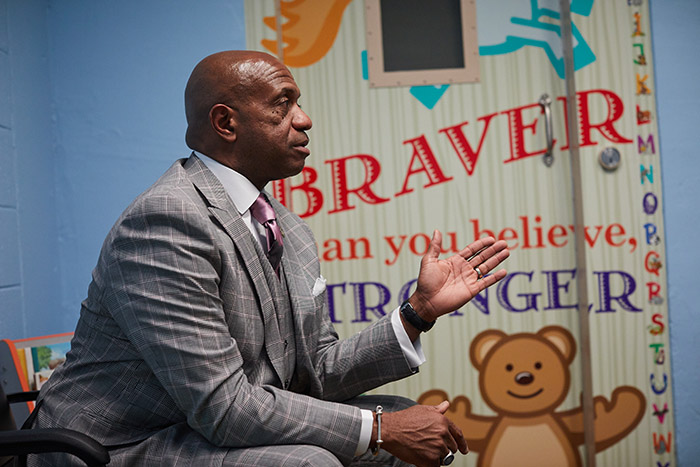Story By Jen McGivney | March 26, 2020

Tim Emry passed through the detention center’s screening last week to speak — through a plexiglass divider — with two of his clients. He commends the jail for good screening practices for people who enter, but wants those practices extended to those already inside. His clients, for example, do not get temperature checks.
“I wish that CMPD and other law enforcement agencies would be called to the carpet and made to explain how they are serving the public good by arresting people on low-level misdemeanors and felonies, when they can be cited,” says Emry, who is part of Decarcerate Mecklenburg.
The jail population remains especially vulnerable to the coronavirus, Emry says. Within the jail are those who are immunosuppressed and older. Some people, because of poverty or homelessness, may not have sufficient sanitary practices.
“God forbid (COVID-19) gets in (the jail) period, but God forbid it gets in there by someone who got arrested for a misdemeanor larceny, and the officer — rather than giving them a ticket — took him to jail. And then he got a bunch of people sick … and some of those people end up dying,” says Emry.
“How do you explain that to the loved ones of those people?”
It’s also happening here. District Attorney Spencer Merriweather agreed to reconsider pretrial confinement decisions over coronavirus, allowing public defenders and defense attorneys like Emry to plea for early dismissal for their clients. Judges review each case to determine if the detainee can be released without creating a threat to public safety.
But Emry has grown impatient with the case-by-case review. He wants judges to release anyone held on misdemeanor and low-level, non-violent felony charges.
Emry believes that the current policy leaves the poor and homeless confined in a jail susceptible to COVID-19 because they can’t afford to leave. “We’ve got people too poor to buy their freedom,” he says.
To release those held on misdemeanor domestic violence charges during a time of shelter-in-place may endanger victims. Emry believes that those accused can be released and monitored electronically when needed.
“Short of managed care facilities, you’re hard pressed to find more vulnerable populations than in our nation’s jails and prisons,” Emry says.
“If that’s really our priority, let’s be about it. If it’s not our priority, then tell the truth — say hey, we’re throwing these people away and we don’t care.”
Read Full Article at Charlotte Agenda
MAR
2020
